Interview with Football Leaks Whistleblower Rui Pinto ‘This Football Mafia Is Everywhere’
WHISTLEBLOWING - SURVEILLANCE, 3 Feb 2020
Nino Seidel and Michael Wulzinger – Der Spiegel
2 Feb 2019 – In an interview, Rui Pinto, the Portuguese young man who kept the industry in suspense over revelations from Football Leaks, discusses his life in anonymity, the explosive power of his documents and accusations that he is a hacker.
“I am not a hacker, I am a whistleblower.” – Rui Pinto
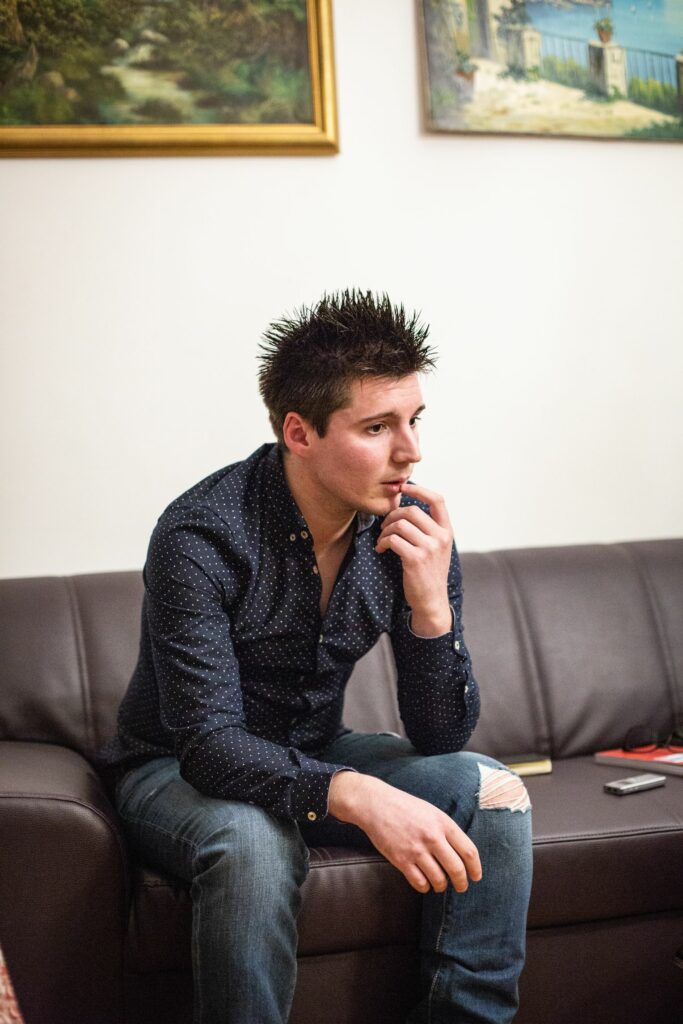
Football Leaks whistleblower Rui Pinto sitting in his apartment in Budapest. He is currently living there under house arrest following his detainment by police almost two weeks ago.
Maria Feck/ DER SPIEGEL
Budapest, District VII. The massive doorway leading to the courtyard behind an old residential building can only be opened by means of a multidigit access code.The stairwell is drafty and dark; on the second floor, a security gate blocks the final meters leading to the door of John’s apartment.
This is where he lives: the whistleblower behind Football Leaks, who has been under house arrest since last week. The man who has severely shaken the football business for the past three years as a phantom using the code name “John.” His data has led to some spectacular revelations and resulted in numerous investigations throughout Europe. The whistleblower handed over more than 70 million documents, many of them marked as strictly confidential, to DER SPIEGEL, which shared the material with the research network European Investigative Collaborations (EIC). It is the largest data leak to date.
httpv://www.spiegel.de/international/world/interview-with-football-leaks-whistleblower-rui-pinto-a-1251121.html?jwsource=cl
https://www.spiegel.de/international/world/interview-with-football-leaks-whistleblower-rui-pinto-a-1251121.html?jwsource=cl
John’s real name is Rui Pinto; his lawyer revealed the identity of the whistleblower after his arrest. The 30-year-old Portuguese national is now awaiting the decision of a Hungarian court. He could face extradition to Portugal, where — a trial that might threaten his very existence.
Pinto opens the gate. He smiles bashfully. He’s wearing slippers on his feet, his trouser leg bulges out around his left ankle. “This is my new friend,” says Pinto, pointing to his electronic ankle bracelet. It contains a transmitter; the whistleblower is only allowed to leave his apartment as far as this gate.
DER SPIEGEL has traveled to Budapest together with German public broadcaster NDRand the French investigative website Mediapart. For two days, Pinto will talk about his life as a whistleblower and about the accusations against him. His apartment is tiny, one and a half rooms, with a narrow kitchen and a cramped bathroom. A rickety bed stands alongside the sofa in the living room. This is where Pinto’s parents sleep. They have come from Portugal and are giving him emotional support.
***************
DER SPIEGEL: Mr. Pinto, are you a hacker?
Pinto: I don’t consider myself as a hacker, but as a citizen who acted in the public interest. My sole intention was to reveal illicit practices that affect the world of football.
DER SPIEGEL: Can you tell us how you got hold of more than 70 million confidential and, in some cases, highly sensitive documents from the international football industry?
Pinto: I initiated a spontaneous movement of revelations about the football industry. So, I am not the only one involved. Over time, more and more new sources have been added, who have shared their material with me, and the database grew. This shows that there are many other people preoccupied by that matter.
DER SPIEGEL: The European arrest warrant that a Portuguese public prosecutor issued against you and which led to your arrest accuses you of cybercrime. This has to do with the club Sporting Lisbon and with the publication of confidential emails in 2015. What do you have to say about that?
Pinto: I am ready to explain all of it before judicial authorities when the time comes, but I deny this description.
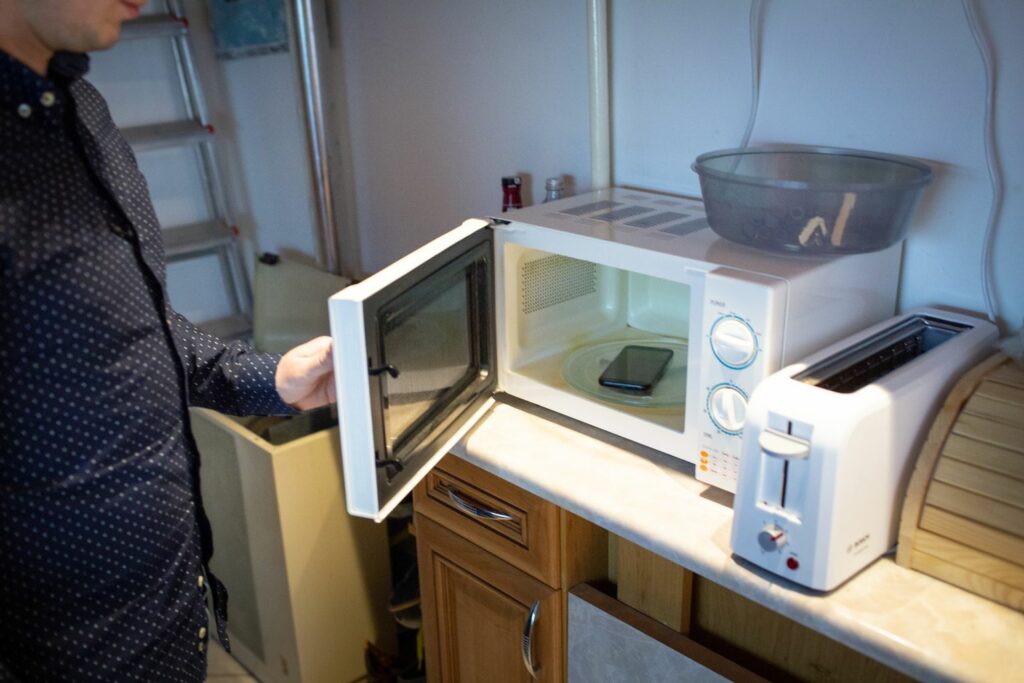
Rui puts his mobile phone inside a microwave in the kitchen during the interview to prevent anyone from eavesdropping on the conversation. Maria Feck / DER SPIEGEL
DER SPIEGEL: In addition, you are accused of having used your inside knowledge to try and blackmail the agency Doyen Sports in the autumn of 2015.
Pinto: The only reason I contacted Doyen was to confirm the wrongfulness of its actions, based on the amount of money they were ready to pay to make the revelations go away.
DER SPIEGEL: That sounds like blackmail.
Pinto: No, I just wanted to see how valuable it was, how important the documents and the information were to Doyen. I thought I could find that out by learning how much Doyen was prepared to pay for my silence. I never had the intention to take the money. I only wanted to expose Doyen.
DER SPIEGEL: You even got a lawyer involved, who was supposed to arrange a deal for you. He met with the managing director of Doyen.
Pinto: I wanted to see what they would offer him. While he was negotiating, I continued to read the documents. As I did so, I told myself: If I allow them to buy me out now, I am no better than this whole business. So, I wrote to Doyen and told them to keep their money. Not a single cent was paid. What I did, was very naïve. Looking back now, I regret it. But I repeat that I deny having committed any criminal offense
DER SPIEGEL: Investigators in Portugal are also said to suspect you of having supplied FC Porto with incriminating emails from their archrival Benfica Lisbon. Did you have anything to do with that?
Pinto: I have not read any statement by the public authorities that finds any connection between me and the Benfica scandal. A magazine released the Benfica story last autumn. It changed my life. My photograph was on cover pages throughout the country. My Facebook account, my email address were subsequently inundated with death threats.
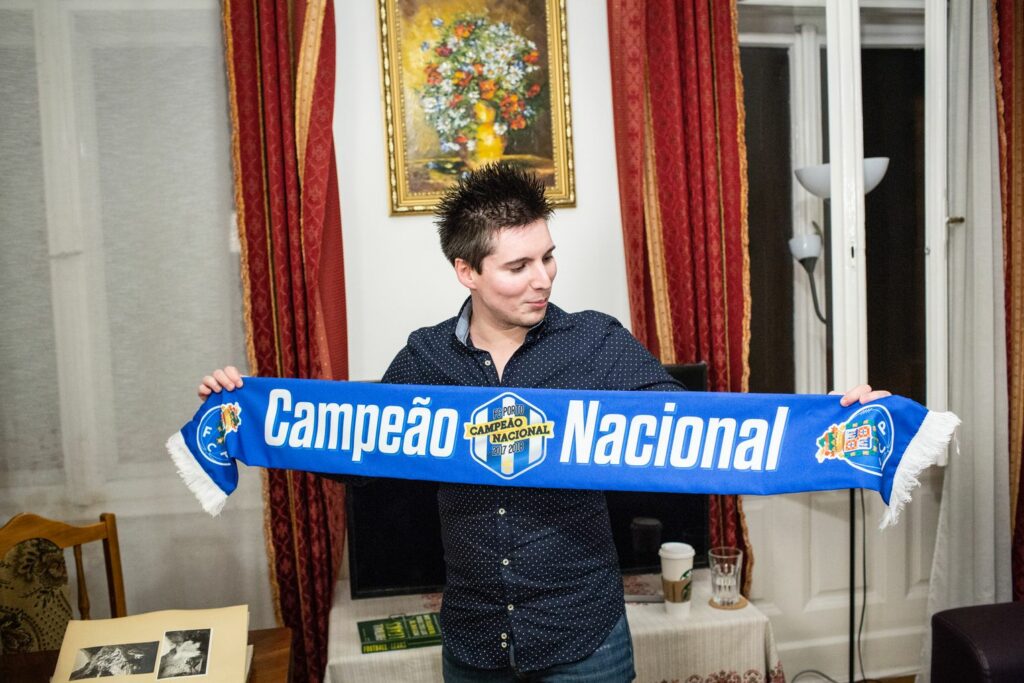
Pinto holding up an FC Porto scarf inside his Budapest apartment. “I am convinced that what I did was the right thing,” he says. “It was never about becoming the world’s greatest whistleblower, but about exposing as many wrongdoings as possible.” Maria Feck / DER SPIEGEL
DER SPIEGEL: Have you ever made money using the power of your knowledge about the criminal dealings of the football industry?
Pinto: To give you a clear answer: no, never.
DER SPIEGEL: Have you received offers to sell your data?
Pinto: Several. Once, I received an anonymous email in which I was offered more than half a million euros. I turned them all down.
DER SPIEGEL: The lawyer who negotiated with Doyen on your behalf in 2015 had already represented you some time before in a dispute with the Caledonian Bank on the Cayman Islands. Portuguese media have reported that you stole $300,000 from this bank. Is that true?
Pinto: That is not the true story.
DER SPIEGEL: What is the true story then?
Pinto: I am not allowed to talk about the precise circumstances because I signed a nondisclosure agreement with the bank. One thing is certain: If I had committed a criminal offense, the bank would have taken me to court. The case was never brought before a court and my criminal record is clean to this day, in Portugal and everywhere else in the world.
DER SPIEGEL: Why did you pick a fight with the Caledonian Bank?
Pinto: At the time, banks in Portugal were going bankrupt; people lost their livelihoods from one day to the next. At the same time, more and more money was disappearing from Europe. Everyone could see that something was amiss. I wanted to take a closer look at things. I wanted to understand the offshore system.
DER SPIEGEL: What did you find?
Pinto: Textbook examples of how to move huge sums of money out of the country and transfer them to accounts in various tax havens. The more I looked into it, the greater my sense of injustice.
DER SPIEGEL: That kind of data could be very interesting for tax investigators.
Pinto: I know. That’s why I held onto it. That data set has a similar potential to the Panama Papers.It shows how the Cayman Islands were systematically used for money laundering and tax evasion.
DER SPIEGEL: What is happening to that data?
Pinto: I would like to share it with the investigating authorities. The documents clearly reveal the front men, the bankers, the accessories and the aids to the tax fraud.
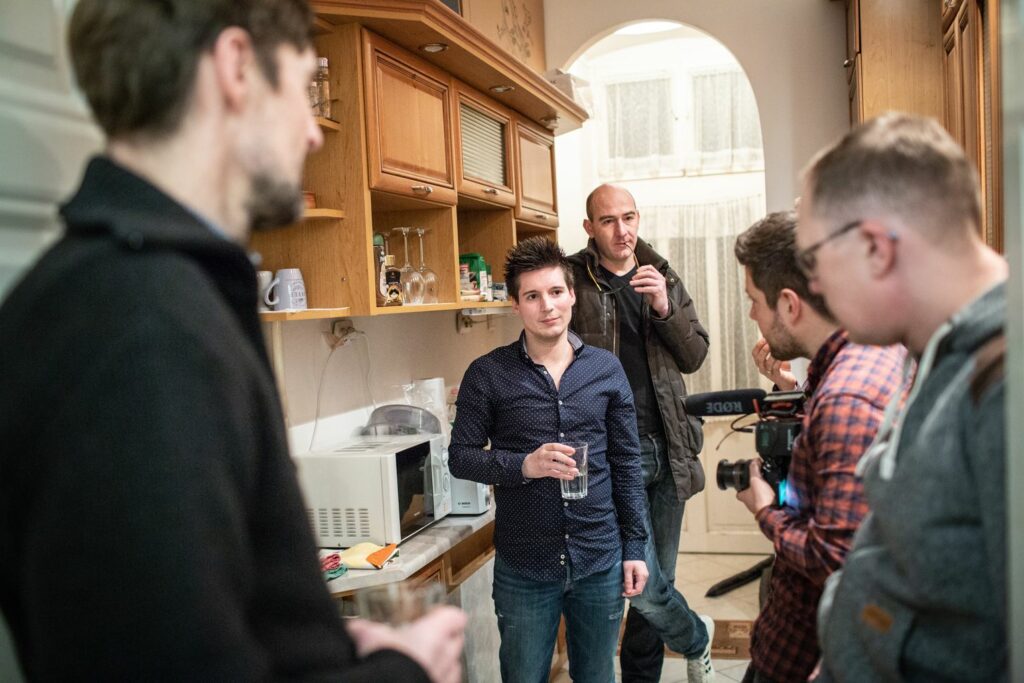
Pinto shows some of the antiques in his apartment during his interview with DER SPIEGEL. He says he has received numerous death threats since a magazine in Portugal published a photo of him this past autumn. He also says he is worried that if he is extradited to Portugal, he could face a biased judiciary. If convicted and sent to jail, he fears even worse. “I am afraid that if I set foot in a Portuguese prison, especially one in Lisbon, I will not leave it alive,” he says.
Maria Feck / DER SPIEGEL
DER SPIEGEL: Opponents of Football Leaks claim that your documents should not be used because they were obtained by illegal means.
Pinto: Others claim the data has been manipulated, falsified or taken out of context. As a result, they say, it cannot be admitted as evidence in a court of law. I think that’s nonsense. The documents are authentic. That is what matters. This and the content.
SPIEGEL: Were you pursuing a particular agenda in procuring your data?
Pinto: I researched who were the key protagonists in the crooked football business, which agents and consultants were most often involved in crooked deals. I wanted to expose those dealings.
DER SPIEGEL: Particularly at the beginning of the Football Leaks research, you had a very large number of documents on Cristiano Ronaldo.Why him?
Pinto: First of all, Ronaldo is my favorite player. I consider him the most complete football player in history. However, his behavior off the pitch needs to be judged entirely differently — in terms of criminal law.For this purpose, Football Leaks is and has been helpful. It couldn’t care less whether our favorite players or our favorite clubs are affected. Football Leaks shows that it acts really unbiased.
DER SPIEGEL: Do you see a difference between a whistleblower and a hacker?
Pinto: I do not consider myself a hacker, just as a normal computer user. In addition, I don’t think it makes any difference whether someone passes on incriminating documents from within a company to the public, or whether they do so with material they receive from outside. In the end it is about whistleblowers exposing dealings which would otherwise remain concealed from society: crimes, wrongdoing and misconduct. In the best case, whistleblowers thereby unleash a public debate and trigger investigation proceedings by the authorities.
DER SPIEGEL: Did you ever have the feeling that you were doing something illegal?
Pinto: No, not to this day. Over the years, the European Parliament, media throughout Europe and many investigative authorities have examined my data. I am convinced that what I did was the right thing.
DER SPIEGEL: Did you never have doubts?
Pinto: I did. Especially because I didn’t always agree with the outcome. The investigating authorities, in particular, often disappointed me. Take the systematic tax evasion by the football industry inSpain. Here, the investigators were almost always happy to cash in a few million euros, and they never really penetrated the root of the evil. Agents, lawyers, bankers: They all went unchallenged. Yet they are the ones pulling the strings; they were the ones who set up these fraud schemes.
DER SPIEGEL: How did you react?
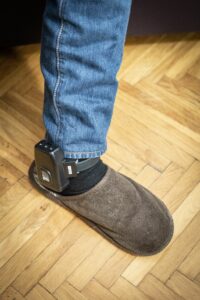
Since a judge ordered his house arrest, Rui Pinto has been forced to wear an electronic ankle bracelet. “This is my new friend,” says Pinto, pointing to the monitor.
Maria Feck / DER SPIEGEL
Pinto: I kept going. I believed that, at some point, something would have to change.
DER SPIEGEL: You once said that your role models were Edward Snowden, Julian Assange and Antoine Deltour, the well-known whistleblowers of the recent past. Do you feel that you rank among them?
Pinto: I don’t wish to compare myself. I never did all this for my ego, I don’t need this attention. It was never about becoming the world’s greatest whistleblower, but about exposing as many wrongdoings as possible. Whistleblowers only exist because of the numerous unlawful practices that are perpetrated in our societies.
‘I Am Afraid that If I Set Foot in a Portuguese Prison, I Will not Leave It Alive’
DER SPIEGEL: Little has been known about you publicly until now. Where in Portugal did you grow up?
Pinto: I come from Vila Nova de Gaia, a town on the Atlantic, not far from Porto.
DER SPIEGEL: What do your parents do for a living?
Pinto: My father is a pensioner. He was a shoe designer for over 30 years and traveled around Europe a great deal. My mother stayed at home. She died of cancer when I was 11. That was a tough time for me.
DER SPIEGEL: Were you a good student?
Pinto: To begin with, I had a head start over the other children because I could already read and write at the age of four.
DER SPIEGEL: Who taught you?
Pinto: I taught myself. While watching football. I watched lots of games, and I always drew the shirts and scenes from the matches. At some point I started writing down individual words which the commentator had said.Who scored, the final score and the course of play.
DER SPIEGEL: How did your parents react?
Pinto: Everyone was surprised. My father was not particularly pleased. He told me I should not watch football so fanatically, otherwise the game would eventually destroy my life.
DER SPIEGEL: Did you like your time at school?
Pinto: It was OK. I was very good at history. Mathematics, chemistry and physics, on the other hand, were a disaster. I played a great deal of football and was also on my school’s futsal team. In addition, I was quite popular because I was kind of a rebel. I often got into lengthy discussions with the teachers when I realized that they were uncertain about something. Sometimes, these debates got out of hand, because I never know when enough is enough. To this day.
DER SPIEGEL: You later went on to study history at university. Where does this interest come from?
Pinto: If you want to understand yourself, the world and your own country, you need to look at history. Because human beings are always making the same mistakes. Always.
DER SPIEGEL: You never finished your history degree. Why?
Pinto: While I was at university, my relationship with Portugal changed.Many of my friends left the country because they no longer saw a perspective for themselves in view of the economic crisis. Politicians and greedy entrepreneurs ruined a once successful country.
SPIEGEL: How did you cope with the situation?
Pinto: First of all, I chose to do an Erasmus term inBudapest.I had never been abroad before, always living with my parents. I came home again after half a year, but I knew that I wanted to return to Hungary quickly. A year later, I emigrated to Budapest.
SPIEGEL: Why Budapest?
Pinto: I love this city.The light, the Danube, the castles and bridges. I would like to stay here forever. I have many friends, and my girlfriend lives here. Also, I have discovered that there is a line of business here for me. My father was very interested in the antiques trade, and I developed quite an understanding of it too. There are lots of treasures in Eastern Europe which no one is paying any attention to.
DER SPIEGEL: You mean old books?
Pinto: And posters. Both can be bought here for very little money, one or two euros, and in some cases sold again for 150 euros or more.
DER SPIEGEL: What gave you the idea in the autumn of 2015 to launch your website Football Leaks?
Pinto: I have been a football fan ever since I was a child, and I already realized around the time of the Bosman ruling that football was developing in the completely wrong direction. The best young players were simply moving to the top teams; the entire competition was shifting to the advantage of the top clubs. The main trigger was the FIFA scandal in 2015. Alongside all the arrests at the international federation, I saw that there were irregularities in numerous transfers within Portugal. That more and more investors were thronging into the market. I started to collect data.
DER SPIEGEL: How did you develop your technical know-how? Did you ever study computer sciences?
Pinto: Never.
DER SPIEGEL: How did you verify the data?
Pinto: I read.I read a great deal.Every day, I spent hours sitting in front of the documents and analyzed them. The more I read, the more shocked I was.
DER SPIEGEL: About what?
Pinto: A great many documents showed how offshore companies were set up, how sports agents hid behind front men, how tax evasion was carried out on a large scale.
DER SPIEGEL: When did you realize that you were making enemies?
Pinto: The company Doyen sent private investigators after me. So, did a powerful club association. Once, a young woman approached me at a party. She flirted with me, but I noticed that something was wrong. She asked me for my number, and I gave it to her. I wanted to see what she was up to.
DER SPIEGEL: Was she a private investigator too?
Pinto: No, she was a tabloid reporter and worked for an English mass-circulation paper.But I only found that out several weeks later. Only when I received an SMS text message: “Hey, we know you are the guy from Football Leaks. I work for a law firm. We are interested in getting documents from you.” She wanted to trick me.
DER SPIEGEL: Why did it take the police so long to find you?
Pinto: Good question. I had an apartment here in Budapest all the time. I lived a completely normal life here.
DER SPIEGEL: At our meetings, you told us that you changed your location every two days.
Pinto: I did travel a lot, yes.But on my normal ID card. I did not hide myself.
DER SPIEGEL: You have a Hungarian girlfriend. What did you tell her when you went away?
Pinto: Keeping all this hidden is very tiring. My girlfriend realized that something was fishy, but I never talked to her about the details. I wanted to protect her. When I was arrested, she almost went berserk.
Just a few weeks after the internet platform Football Leaks went online in the autumn of 2015, DER SPIEGEL got in touch with the people behind the site. First by email, and later Pinto also allowed DER SPIEGEL to visit him. Numerous meetings followed in different locations. But Pinto imposed certain rules: He didn’t want to be photographed, and his pseudonym was to be “John.”
Pinto opted for a life in anonymity. He wanted the public focus to be on the revelations from his data and not him as a person. For investigative journalists, protecting a source is one of the key duties, if not the most important. That’s the reason DER SPIEGEL accepted Pinto’s rules. And this despite the fact that, to this day, he has never wanted to talk about the details of his work — neither about how he obtained the data, nor about how many fellow campaigners helped him.
DER SPIEGEL and the EIC investigative reporting network nevertheless decided to work with the whistleblower’s documents. Three aspects were decisive: Pinto’s data is authentic; it is of strong public interest; and, on top of this, Pinto never interfered with the verification of the documents. He allowed the journalists to carry out their research on the material independently. Journalists, after all, need to be able to independently review which content is in the public interest. Football Leaks included numerous leads concerning very private matters: the sexual orientation of professional football players, adultery, relationships that had gone to pieces. DER SPIEGEL never pursued such leads. They are none of the business of the general public.
In the interaction between DER SPIEGEL and Pinto, the whistleblower, there is a red line that has never been crossed: DER SPIEGEL has never asked Pinto to obtain any documents — neither by legal nor by illegal means.
DER SPIEGEL: How and where in Budapest were you arrested?
Pinto: It was in the early evening on Jan. 16. My father, who was visiting me together with my stepmother, and I came back from shopping at a supermarket. When we turned down the street in which my apartment lies, two plain-clothes officers approached me. They checked my ID and I had to empty out my pockets and the backpack. Then they showed me the European arrest warrant, everything in Hungarian, and handcuffed me.
DER SPIEGEL: Did the officers also search your apartment?
Pinto: They didn’t have a search warrant on them. Nevertheless, they used my key to access the apartment. My stepmother was shocked when all of a sudden nine police officers stood facing her in the kitchen. They told me to pack my things. One of them said: You are never coming back here again.
DER SPIEGEL: Were you able to contact a lawyer during your arrest?
Pinto: They prohibited me from doing so. I said goodbye to my parents and told them everything was going to be fine. Then I was taken to a police station. I was locked into a cell for two. The other guy was OK. But at night, a guard came around every half-hour and switched the light above my bunk on and off. That only happened to me.
DER SPIEGEL: How long did you remain in the cell?
Pinto: Two nights. Then I was taken to the hearing at which the judge ordered me to be held under house arrest.
DER SPIEGEL: Did the Hungarian police confiscate any objects in your apartment?
Pinto: My computer, about 10 hard drives, three mobile phones and a couple of other electronic devices too.
DER SPIEGEL: Is this data relevant to the general public, because it might describe criminal offenses?
Pinto: Yes, definitely.
DER SPIEGEL: What volume of data are we talking about?
Pinto: Ten terabytes, about six of which I have not yet passed on.
DER SPIEGEL: Do you or your fellow campaigners have copies of this data?
Pinto: I cannot answer that either.
DER SPIEGEL: The Portuguese authorities are seeking your extradition. What do you think will happen to the confiscated data if the Portuguese judiciary get ahold of it?
Pinto: The Hungarians ought not to hand over these hard drives to them at all, because the arrest warrant only lists allegations dating back to 2015. I think the Portuguese first want to get their hands on everything that was found on me, in order to prepare further lawsuits against me.
DER SPIEGEL: What are you hoping for?
Pinto: I expect public prosecutor’s offices throughout Europe to get together and demonstrate to the Hungarian and Portuguese authorities that my information is of great public interest. That they need these documents for their investigations, so as to pursue crimes, crimes that are considerably more serious than whistleblowing.
DER SPIEGEL: Which European investigating authorities are you already in touch with?
Pinto: With several.I know that my French lawyer, William Bourdon, is in contact with the Swiss and the Belgian prosecutors. But so far, I have only met with the French investigators.
DER SPIEGEL: When did the first meeting take place?
Pinto: At the end of 2018, in Paris.
DER SPIEGEL: At the time, was it only about your assistance as an anonymous witness, or had you already considered revealing your identity?
Pinto: We talked about all the possible options.
DER SPIEGEL: Did you reveal your identity to the French authorities last year?
Pinto: Yes. I told them that I was John.
DER SPIEGEL: Have you already handed over documents to the French authorities, or are the relevant documents among the material that has now been confiscated?
Pinto: The only thing I can say, is that we are cooperating.
DER SPIEGEL: What about the investigations against Cristiano Ronaldo, who is accused of rape by an American woman, which Ronaldo denies?
Pinto: I know very well that there is an investigation, but I don’t wish to comment on that.
DER SPIEGEL: Were you approached by the U.S. authorities?
Pinto: Correct.
DER SPIEGEL: What does that mean precisely?
Pinto: It’s an ongoing investigation and I really prefer not to comment on that.
DER SPIEGEL: Did investigating authorities already get in touch with you after the first major Football Leaks revelations in 2016?
Pinto: I received a few emails from tax authorities, including one from Germany, from Munich.
DER SPIEGEL: How did you behave at the time?
Pinto: Some of the inquiries were quite brash. The financial investigators from England first wanted to know my name and where I lived. That is crazy for a whistleblower who wishes to remain anonymous; naturally I did not reply. At that time, I had no lawyers. I needed time and a strategy that would guarantee my personal protection. Even at that time, the most credible inquiry came from France.
DER SPIEGEL: Why?
Pinto: They seemed very determined and professional. They made it clear that they seriously wanted to pursue cases of corruption, money laundering and tax evasion in football. I had the feeling I could trust them, and I needed a strong partner. The French officials are able to launch investigations through Eurojust. I can share my data with them, and they can then pass it on. One contact is enough. I understand that Eurojust is a very useful tool for the authorities from various countries to coordinate their cooperation. If other countries seriously want to carry out investigations, they will have France. And they will have me.
DER SPIEGEL: After the Football Leaks revelations, did any association ever try to get in touch with you?
Pinto: Neither FIFA nor UEFA contacted Football Leaks. This is frustrating. In my interviews using the pseudonym “John,” I repeatedly made it clear that I would pass on documents in the interest of shedding light on the facts, if I was given a sign. I never received a single one.
DER SPIEGEL: Why are you resisting your extradition to your home country?
Pinto: I am fairly certain that I will not be given a fair trial in Portugal. The Portuguese judiciary is not entirely independent; you run up against a lot of hidden, covert interests. Of course, there are public prosecutors and judges who take their job seriously. But this football mafia is everywhere. They want to send the message that no one should pick a fight with them.
DER SPIEGEL: Are you afraid of a potential prison sentence in Portugal?
Pinto: I am nervous because I am a target for attacks, especially by fans of Benfica Lisbon. Ever since last autumn, I have been receiving massive death threats on Facebook. When I met with French investigators, I showed them these. They said the threats should be taken very seriously. I am afraid that if I set foot in a Portuguese prison, especially one in Lisbon, I will not leave it alive.
DER SPIEGEL: Mr. Pinto, we thank you for this interview.
_________________________________________________
Interview Conducted by Rafael Buschmann, Hendrik Maassen (NDR), Yann Philippin (Mediapart)
Tags: Africa, Angola, Capitalism, Corruption, Economics, Elites, Exposé, Finance, Football Leaks, Isabel dos Santos, Luanda Leaks, Rui Pinto, Super rich, Whistleblowing
DISCLAIMER: The statements, views and opinions expressed in pieces republished here are solely those of the authors and do not necessarily represent those of TMS. In accordance with title 17 U.S.C. section 107, this material is distributed without profit to those who have expressed a prior interest in receiving the included information for research and educational purposes. TMS has no affiliation whatsoever with the originator of this article nor is TMS endorsed or sponsored by the originator. “GO TO ORIGINAL” links are provided as a convenience to our readers and allow for verification of authenticity. However, as originating pages are often updated by their originating host sites, the versions posted may not match the versions our readers view when clicking the “GO TO ORIGINAL” links. This site contains copyrighted material the use of which has not always been specifically authorized by the copyright owner. We are making such material available in our efforts to advance understanding of environmental, political, human rights, economic, democracy, scientific, and social justice issues, etc. We believe this constitutes a ‘fair use’ of any such copyrighted material as provided for in section 107 of the US Copyright Law. In accordance with Title 17 U.S.C. Section 107, the material on this site is distributed without profit to those who have expressed a prior interest in receiving the included information for research and educational purposes. For more information go to: http://www.law.cornell.edu/uscode/17/107.shtml. If you wish to use copyrighted material from this site for purposes of your own that go beyond ‘fair use’, you must obtain permission from the copyright owner.
Read more
Click here to go to the current weekly digest or pick another article:
WHISTLEBLOWING - SURVEILLANCE: